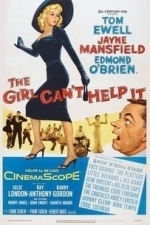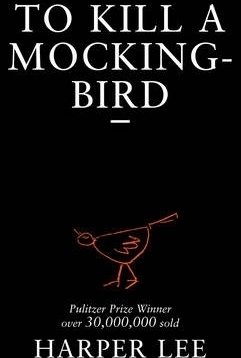Search
Search results
Jon Savage recommended The Girl Can't Help It (1956) in Movies (curated)
Kayleigh (12 KP) rated To Kill a Mockingbird in Books
Jan 2, 2019
Well, February is definitely the month for discovering classics I’ve missed! For some reason, I’d always classed To Kill a Mockingbird in amongst the Agatha Christie genre of murder mysteries – not that I’ve read those either – and didn’t know enough about it for it to have piqued my interest. Now I’ve read it though, I can see what all the fuss is about, and it’s not surprising that, despite being published in 1960, it was still the <a href="http://www.guardian.co.uk/news/datablog/2012/aug/09/best-selling-books-all-time-fifty-shades-grey-compare">65th best-selling book of all time</a> in 2012. Beware of spoilers!
The story is set in Maycomb, Alabama in the 1930s, and is written from the perspective of Jean Louise ‘Scout’ Finch, who is between six and eight years old as the story progresses. The start of the book does an effective job of introducing us to all the characters. Scout lives with her widowed father, Atticus, a lawyer, her brother Jem (who is 4 years older than her) and Calpurnia, a black woman who acts as a type of mother figure. A friend, Dill, also joins them in the summer. The three children are intrigued by Arthur ‘Boo’ Radley, who lives in the house on the corner but is never seen outside. I really enjoyed this part of the story; it set the scene brilliantly, as well as helping me reminisce about my own childhood. Even if there is no ‘haunted’ house, children will always make one – at least, my brother and I did! With the limitless amounts of imagination children have, there will always be adventures to be had and ‘monsters’ to escape from. There was one particular house, when we were around the same age as Jem and Scout, where they had a doorbell you pulled, like a cord. My brother Josh said it was a doorbell that made you scream every time you pulled it, so we obviously had great fun in pulling it, screaming, and running away. If by some fluke the person living there is reading this, I’m really sorry, but it still makes me laugh! There was also every Christmas, when we went carol singing. We had decided that the houses beyond the wood were richer than the others, and every year would link arms, lighting matches to try and find our way in the dark and telling ghost stories the whole time.
Once everything has been established, the book moves on to a case Atticus is defending. A black man, Tom, has been accused of raping Mayella Ewell, part of a trashy white family with very poor education and even less money. This is where the casual prejudice of the time is evident – Jem and Scout have to put up with people calling their family a “nigger-lover” (sorry if that language offends, it is a direct quote and I mean no harm); Atticus faces repercussions for his whole-hearted attempt to save Tom; and many of the Maycomb women look down on the black community. However, there’s still a touch of hope – the way Atticus defends Tom’s case makes everybody think, a great feat in the setting where black and white people are in completely different classes. In this part of the story, I really looked up to Atticus, in his seemingly-infinite wisdom.
In the final part of the story, Jem and Scout finally get to meet Boo Radley, and it is here that the title of the book becomes apparent. In the middle of the book, after Jem and Scout get air-rifles, it is said:
<blockquote>When he gave us our air-rifles Atticus wouldn’t teach us to shoot. Uncle Jack instructed us in the rudiments thereof; he said Atticus wasn’t interested in guns. Atticus said to Jem one day, “I’d rather you shoot at tin cans in the back yard, but I know you’ll go after birds. Shoot all the bluejays you want, if you can hit ‘em, but remember it’s a sin to kill a mockingbird.”
That was the only time I ever heard Atticus say it was a sin to do something, and I asked Miss Maudie about it.
“Your father’s right,” she said. “Mockingbirds don’t do one thing but make music for us to enjoy. They don’t eat up people’s gardens, don’t nest in corncribs, they don’t do one thing but sing their hearts out for us. That’s why it’s a sin to kill a mockingbird.”</blockquote>
Obviously, not knowing what was coming, I thought the story must eventually be about the children shooting a mockingbird. The last page of the book, though, I realised that it was a lot more subtle and symbolic than that. The mockingjay is Boo Radley, the man who gives when he can and causes no harm.
I really wish I’d read this story as a child, to see what sort of perspective I’d have had back then. Reading as an adult means that, while Scout was a brilliant perspective, I was almost reading as an outsider. I could see her maturing, slowly fitting the pieces together to start acting like an adult, but at the same time it was an undeniably adult reading. I really really enjoyed the book, but I have a feeling it’s one of those multi-faceted ones where you read something different every time. I can’t help thinking that reading it as a child would have been a lot more powerful.
This review is also on my <a href="http://awowords.wordpress.com">blog</a>; - if you liked it, please check it out!
The story is set in Maycomb, Alabama in the 1930s, and is written from the perspective of Jean Louise ‘Scout’ Finch, who is between six and eight years old as the story progresses. The start of the book does an effective job of introducing us to all the characters. Scout lives with her widowed father, Atticus, a lawyer, her brother Jem (who is 4 years older than her) and Calpurnia, a black woman who acts as a type of mother figure. A friend, Dill, also joins them in the summer. The three children are intrigued by Arthur ‘Boo’ Radley, who lives in the house on the corner but is never seen outside. I really enjoyed this part of the story; it set the scene brilliantly, as well as helping me reminisce about my own childhood. Even if there is no ‘haunted’ house, children will always make one – at least, my brother and I did! With the limitless amounts of imagination children have, there will always be adventures to be had and ‘monsters’ to escape from. There was one particular house, when we were around the same age as Jem and Scout, where they had a doorbell you pulled, like a cord. My brother Josh said it was a doorbell that made you scream every time you pulled it, so we obviously had great fun in pulling it, screaming, and running away. If by some fluke the person living there is reading this, I’m really sorry, but it still makes me laugh! There was also every Christmas, when we went carol singing. We had decided that the houses beyond the wood were richer than the others, and every year would link arms, lighting matches to try and find our way in the dark and telling ghost stories the whole time.
Once everything has been established, the book moves on to a case Atticus is defending. A black man, Tom, has been accused of raping Mayella Ewell, part of a trashy white family with very poor education and even less money. This is where the casual prejudice of the time is evident – Jem and Scout have to put up with people calling their family a “nigger-lover” (sorry if that language offends, it is a direct quote and I mean no harm); Atticus faces repercussions for his whole-hearted attempt to save Tom; and many of the Maycomb women look down on the black community. However, there’s still a touch of hope – the way Atticus defends Tom’s case makes everybody think, a great feat in the setting where black and white people are in completely different classes. In this part of the story, I really looked up to Atticus, in his seemingly-infinite wisdom.
In the final part of the story, Jem and Scout finally get to meet Boo Radley, and it is here that the title of the book becomes apparent. In the middle of the book, after Jem and Scout get air-rifles, it is said:
<blockquote>When he gave us our air-rifles Atticus wouldn’t teach us to shoot. Uncle Jack instructed us in the rudiments thereof; he said Atticus wasn’t interested in guns. Atticus said to Jem one day, “I’d rather you shoot at tin cans in the back yard, but I know you’ll go after birds. Shoot all the bluejays you want, if you can hit ‘em, but remember it’s a sin to kill a mockingbird.”
That was the only time I ever heard Atticus say it was a sin to do something, and I asked Miss Maudie about it.
“Your father’s right,” she said. “Mockingbirds don’t do one thing but make music for us to enjoy. They don’t eat up people’s gardens, don’t nest in corncribs, they don’t do one thing but sing their hearts out for us. That’s why it’s a sin to kill a mockingbird.”</blockquote>
Obviously, not knowing what was coming, I thought the story must eventually be about the children shooting a mockingbird. The last page of the book, though, I realised that it was a lot more subtle and symbolic than that. The mockingjay is Boo Radley, the man who gives when he can and causes no harm.
I really wish I’d read this story as a child, to see what sort of perspective I’d have had back then. Reading as an adult means that, while Scout was a brilliant perspective, I was almost reading as an outsider. I could see her maturing, slowly fitting the pieces together to start acting like an adult, but at the same time it was an undeniably adult reading. I really really enjoyed the book, but I have a feeling it’s one of those multi-faceted ones where you read something different every time. I can’t help thinking that reading it as a child would have been a lot more powerful.
This review is also on my <a href="http://awowords.wordpress.com">blog</a>; - if you liked it, please check it out!

